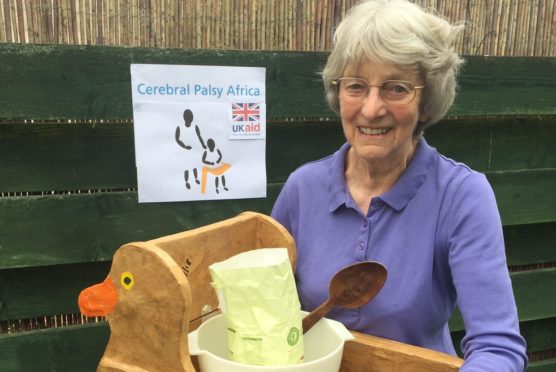
A charity is teaching Africans how to make papier mache furniture for children with cerebral palsy.
The training programme, funded by the UK Government’s foreign aid budget, will see 21 people shown how to build specialist chairs and standing frames using flour, water and cardboard.
Retired physiotherapist Archie Hinchcliffe founded Cerebral Palsy Africa after she discovered children had to lie on the floor for lessons because their school could not afford expensive specialist furniture.
The papier mache equipment was developed by Archie’s friend Jean Westmacott. It is so sturdy that she has used a sofa bed made of papier mache for more than 25 years.
Archie, 79, explained: “The furniture is incredibly tough and hard. You can’t believe how strong it is.
“I know a lot of people in Britain will find it hard to grasp the idea that schools simply don’t even have chairs for children.
“For children with cerebral palsy, this is a real problem and they get terrible secondary disabilities from being forced to just lie on the floor.
“It’s hardly a good learning environment.
“When I first looked into this problem, every time I tried to get carpenters to make them it cost way too much.
“This solution costs a fraction of the thousands of pounds it would for a joiner to craft them and enables us to help so many more children.”
The charity, based in Duns in the Scottish Borders, will use a £50,000 Small Charities Challenge Fund (SCCF) grant to train 21 Ghanaian special needs professionals how to make the furniture out of waste paper and flour instead.
The Department for International Development is hoping to encourage more small Scottish charities to apply for funding when its SCCF scheme is relaunched later this year.
The DFID said: “Britain’s small charities do an extraordinary amount of good in the world.
“They embody our generosity and our concern, as a country, for helping others. The Small Charities Challenge Fund is there to make sure they get the support they need to help us end poverty once and for all.
“The fund will reopen this year and we are encouraging small charities from every corner of the UK to apply.”

Enjoy the convenience of having The Sunday Post delivered as a digital ePaper straight to your smartphone, tablet or computer.
Subscribe for only £5.49 a month and enjoy all the benefits of the printed paper as a digital replica.
Subscribe